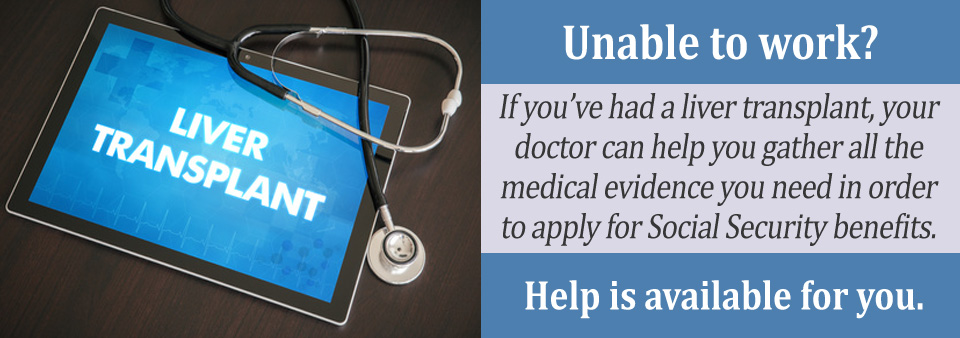Have are you on the waitlist for a liver transplant? If so, you might be eligible for Social Security disability benefits. Social Security Disability Benefits (SSDI) is available for adults unable to work due to a serious illness.
The Importance of the “Blue Book”
The SSA uses its own medical guide, known as the Blue Book, to determine whether or not a condition such as a liver transplantation is severe enough to warrant disability payments. Each condition in the Blue Book lists specific criteria and symptoms that you must have to be approved.
Many of the listings include information on the specific evidence required, such as clinical and laboratory tests.
It is of vital importance to work with your health care providers to ensure that you have completed all of the medical tests required by the SSA and that all of your medical evidence is in order.
Liver transplantation is listed in the Digestive section, 5.09, of the Blue Book. To help you with the information gathering process, here are the most relevant medical evidence that you will need to provide to give you the best chance of being approved for SSDI.

Evidence Needed Related to Your Liver Transplantation
The Blue Book indicates that anyone who has received a liver transplant is eligible for benefits from the day of transplant until one year following the transplant. While no further documentation is specifically required, you will want to ensure that your physician is keeping accurate documentation of your recovery, as once a year has gone by, you will be evaluated for disability based on any residual impairments.
Post- transplant records from your physician should include:
- Adequacy of post‑transplant liver function
- Including several liver-function blood tests over time
- Any requirements for post‑transplant antiviral therapy
- The frequency and severity of rejection episodes
- Related comorbid complications
- Any and all adverse treatment effects
- Records of all hospitalizations required post-transplant
Evidence Needed Related to Your Liver Transplant Medications
Liver transplant patients require medications for the rest of their lives. These medications include anti-rejection medications and anti-infective medications.
It is critical that your physician documents the following:
- Medications you receive, including the doses
- How often you require medication
- Any side-effects that you have experienced related to your medications
The Blue Book notes that one-year post transplant, you will be evaluated based on your ability to function. You may still be unable to work one year after your liver transplant. Information on your reactions and side effects to your treatments or medications are essential to provide to the SSA.
So long as you can prove that you are too ill to work due to complications that persist after one year, you may still qualify for financial assistance.
Evidence Needed Related Your Quality of Life and Ability to Care for Yourself
One year after your liver transplant you still may be too ill to work. If this is the case, your physician should provide physician notes documenting his or her opinion regarding your limitations and inability to function without unscheduled breaks or days off.
The more specific that your doctor is about your limitations, the better your chances are of being approved for disability benefits. If you are unable to work due to limitations from your disease, you may still qualify for disability through a residual functioning capacity assessment.
Steps You Can Take to Win Your Disability Claim
If you haven’t applied yet, or if you have applied and were denied, remember that medical evidence listed in the Blue Book is arguably the most important factor in your Social Security disability claim for a liver transplantation.
While you don’t need to provide medical documentation to the SSA yourself, it is helpful to be as organized as possible. When you visit your doctor, it is a good idea to present a written list of symptoms and side-effects that you are experiencing.
There are several ways that your physician can help including:
- Ensuring that your full medical history is up to date
- Listing your past treatments and responses, as well as the plan for the future
- Documenting all of your medications and experienced side effects
- Performing any additional blood tests or procedures that you are missing
- disability doctor letter
A Social Security disability attorney or advocate can assist you in ensuring that you claim for disability is thorough, thus increasing your chances of approval. Consider a Free Evaluation with a Social Security advocate or attorney in your area today. Disability lawyers are only paid if you win your liver transplant claim.